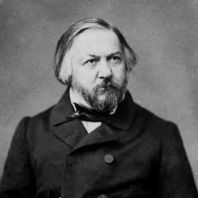ミハイル・グリンカ
作曲
Mikhail Glinka is regarded as the founder of Russian music. As a nobleman dabbling in composition, he managed to develop his musical talent through self-study to such an extent that, after only five months of study under Siegfried Dehn in Berlin, he was able to write A Life for the Tsar, an opera that eclipsed everything that had been composed in Russia up to that point. One of his most popular works to this day is the overture to Pushkin’s opera Ruslan and Ludmilla – a captivating piece with a rapid tempo that demands the utmost virtuosity from the orchestra.
Mikhail Glinka, born in 1804, grew up on his father’s estate in the far west of Russia. When he heard a chamber music work by the Swedish composer Bernhard Crusell at the neighbouring estate where his uncle maintained an orchestra of serfs, he decided to become a musician. Glinka received violin lessons from a musician in the orchestra and piano lessons from a governess before attending a school for children of the nobility, one of the best educational institutions in Russia at the time, from 1818 to 1822. At the same time, he took private lessons (piano, violin and music theory) and began composing – including an unfinished septet, which is considered one of the first attempts at a symphonically inspired sonata cycle for a larger chamber ensemble in Russian music. In 1824, Glinka took up a civil service position in St Petersburg, an undemanding job which provided him with a regular income. When his first works appeared in print four years later, he resigned from his post to devote himself entirely to composing. On his extensive travels, he met not only Bellini and Donizetti, but also Felix Mendelssohn and Hector Berlioz, who would become his lifelong friend. In 1833, Glinka then studied under Siegfried Dehn in Berlin. Three years later, he completed his first opera A Life for the Tsar, whose premiere in 1836 made him Russia’s leading composer overnight. After Ruslan and Ludmilla (1837–42), Glinka’s creative output declined significantly. He died in Berlin in 1857, where he had once again taken up studies under Dehn.